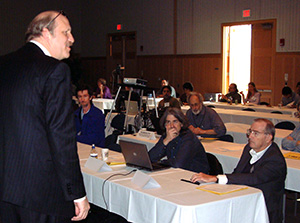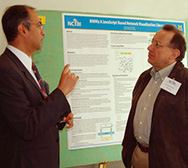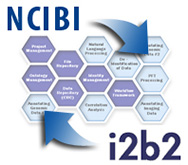- Search NCIBI Data
(e.g. diabetes, csf1r) - Login

 Outreach and Dissemination
Outreach and Dissemination
The Outreach and Dissemination core promotes and facilitates the use of NCIBI resources and works to assure their accessibility and relevance to users’ needs. Among its primary functions, this core: supports scientists in adopting and customizing NCIBI tools and databases for specific research purposes; coordinates publications by NCIBI specialists about biomedical discoveries and computational advances fostered by the Center; sustains exchanges and discussions through e-networking; and implements and supports the Center’s data sharing and software dissemination policies.
In addition, the core enhances biomedical communities and institutes through collaborations with national partners and through conferences, presentations, and keynote addresses.
Multiple Points of Access to NCIBI Resources
Both the NCIBI gateway and RSS feeds enable users to locate diverse resources that can support and augment their research needs. These include:
- Tools
- Publications
- Presentations
- Tools and Technology seminar series
- Videos of annual research meetings and other workshops
- News and events
- An NCIBI RSS feed offering recent news, updates, and information about upcoming Tools and Technology presentations as well as other NCIBI seminars
User Assistance
The following outreach services, provided as part of the core’s user support efforts, are intended to assist the scientific community in adopting and assimilating NCIBI tools:
- Training sessions and videos
- User help materials
- Technical support by email
- Health Sciences Libraries courses
Collaborations with NCIBI
The Center offers a number of opportunities for national and local collaborations and partnerships, among them:
NCBCs — NCIBI has led the NCBC Biositemaps project and works closely with NCBO, the University of Pittsburgh Medical Center (UPMC), and CCB to develop and deploy tools, define and extend standards, and disseminate information. The Center is also supporting current efforts to extend
biositemap coverage from the initial seven NCBC centers to seven additional CTSA centers and, ultimately, to all 39 CTSAs.
Tool Integration — NCIBI recently demonstrated a prototype for integrating NCIBI Tools into the i2b2 “Hive” framework.
Research Colleges at Minority Institutions (RCMI) Network — Annual summer workshops feature tutorials on NCIBI and related tools along with presentations by the RCMI faculty on their research interests. Additional workshops hosted by various RCMI sites are held throughout the year.
Collaborative Grant Proposals
Pilot Projects
In 2008, NCIBI proposed a pilot project program to expand participation in research related to one of its DBPs. For information about selected pilot projects or to submit an inquiry, click here.
Cytoscape Core Development Community
NCIBI developers and user interface specialists belong and contribute to the core development community of Cytoscape.
An Invitation to Participate in NCIBI's Social Network
The NCIBI virtual community is comprised of research scientists from 63 countries. Join them via NCIBI’s listservs and sign up as a Facebook fan. NCIBI also hosts secure collaborative workspaces for stakeholders. Click here to set up your workspace.
Advancing Biomedical Research through Resource Sharing: NCIBI Data Sharing Policies
Software funded by NIH and developed by NCIBI is freely available to biomedical researchers and educators in the non-profit sector, including educational institutions, research institutions, and government laboratories. The terms of software use permit the creation of derivative works as well as
collaborative development of tools with academic and non-profit institutions.
These policies are in accordance with the Creative Commons Licensing agreements CC-GNU GPL, CC-GNU LGPL (http://creativecommons.org/choose/).
NCIBI terms of use can be viewed online at http://portal.ncibi.org/gateway/pdf/Terms%20of%20use-web.pdf .
NCIBI complies with the NIH data sharing policy and fair use standards
(http://grants.nih.gov/grants/guide/notice-files/NOT-OD-03-032.html ).




 NCIBI on Facebook
NCIBI on Facebook NCIBI RSS Feed
NCIBI RSS Feed

